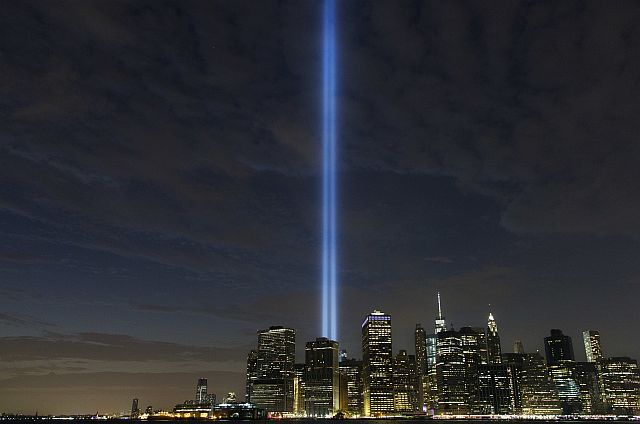
The Tribute in Light rises above the lower Manhattan skyline in New York. Sunday marks the 15th anniversary of the terrorist attacks of Sept. 11, 2001 on the United States (AP PHOTO).
Washington, United States — The 9/11 attacks of 2001 forever changed America and upended its foreign and national security policy, leaving the country for the past 15 years in a war against jihadists — without ending the upheaval in the Middle East.
Barack Obama, who will leave the White House in January, is the president who tried to get the US military out of the quagmires in Iraq and Afghanistan — devastating “war on terror” conflicts launched by his predecessor George W. Bush in the wake of the suicide plane strikes that killed nearly 3,000 people.
But Obama’s legacy on that front is mixed, with US forces still present in both countries.
And while he worked hard to bring America closer to the Muslim world, he will leave office with the United States bogged down in a seemingly endless conflict against Islamists at home and abroad, experts say.
“The evolving threat of Islamist terrorism compelled President Obama, against his own inclinations, to engage militarily in Iraq once again, and since then in Syria and Libya as well,” said Tamara Cofman Wittes, director of the Center for Middle East Policy at the Brookings Institution in Washington.
“The wars in the Middle East, the metastasis of ISIS, online radicalization and a series of attacks in European and American cities have made the paradigm of a ‘global war on terror’ very hard to set aside, even 15 years after 9/11,” she wrote on the World Economic Forum website.
The US is also still engaged militarily, in limited form or on a purely logistical basis, in Afghanistan, Nigeria, Somalia and Yemen to counter myriad threats.
“The thinking of the Obama administration is that big wars make things worse,” Hussein Ibish, a senior resident scholar at the Arab Gulf States Institute, told AFP.
Disclaimer: The comments uploaded on this site do not necessarily represent or reflect the views of management and owner of Cebudailynews. We reserve the right to exclude comments that we deem to be inconsistent with our editorial standards.
